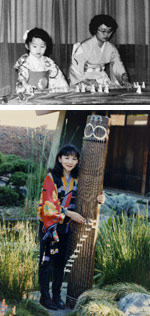Berkeleyan
The world of Shirley Wong
Campus koto player fuses the traditional and the modern
![]()
| 18 February 2004
| |  Public Affairs staffer Shirley Wong (left, top photo) grew up around the koto; her mother (also pictured) was a teacher of the traditional Japanese instrument. Today (above) Wong plays koto in the Murasaki Ensemble, a jazz-cum-world-music fusion band that will play a rare one-night gig at Yoshi’s next month. Photos courtesy Shirley Wong |
By day, mild-mannered Shirley Muramoto-Wong works as an administrative assistant in Public Affairs. In her off-campus life, she’s an accomplished koto player who has recorded with such local luminaries as mandolinist David Grisman and bluegrass vocalist Laurie Lewis.
The decidedly twangy leanings of Grisman and Lewis might seem an unnatural pairing with the zither-like strains of the koto, one of the primary instruments in traditional Japanese music. “I’ve always looked for some way that I could express my American side,” says Wong, who performs under her maiden name of Muramoto, most frequently as a founding member of the Murasaki Ensemble, a group that fuses jazz and world music. That’s not as much of a stretch as it might seem for the classically trained Wong, who cites the jazz-rock fusion group Hiroshima among her musical influences. “I always thought I could do a little bit of both,” she says.
Wong’s koto roots run deep. Her mother, who teaches the instrument, began studying it at age nine at the insistence of her parents, while the family was interned at the Topaz and Tule Lake relocation camps along with thousands of other Japanese Americans during World War II. To refurbish an old koto that he found, Wong’s grandfather fashioned strings from reeds and carved the instrument’s bridges from pieces of wood and toothbrushes.
Wong grew up with the koto, listening to her mother give lessons. At age five she started “fooling around” with the instrument, becoming more serious when she turned eight. Then, in elementary school, in part to forge an identity separate from her mother’s, she focused primarily on violin. “I felt like the koto was my mother’s instrument,” she recalls, but “she didn’t know anything about the violin.”
When Wong announced that she wanted to major in music in college, her mother dissuaded her, telling her she wouldn’t make any money. “That was sad for me,” says Wong, “because I really wanted to pursue music, and I wasn’t sure what to do after that.”
Instead, she came to Berkeley to study Japanese, and began giving koto lessons in her apartment. After graduation, she traveled to Japan and earned a degree in koto instruction. “I’ve been very fortunate that the koto ‘found’ me,” she says, “because it’s the one thing that’s been my lifelong passion.”
It’s a passion she has sustained for more than 30 years. During that time she married, raised two sons, worked for the airlines, and then got a job on campus (in University Relations) in 1998, and moving to Public Affairs 18 months later. Returning to Berkeley yielded a teaching opportunity for Wong when, shortly after her arrival, she was invited to teach the koto section in a music department class on the music of Japan.
“Shirley is a motivator,” says Professor of Music Bonnie Wade, who has worked with Wong off and on for six years. “She inspires students of the koto to learn more and try more.” After Wong encouraged one student to write a piece for the instrument, Wade built a koto-composition project into the course, which resulted, she says, in several “very innovative, creative group pieces.”
What a little moonlighting can do
Wong founded the Murasaki Ensemble nearly 15 years ago. Incredibly, the group’s initial instrumentation included four kotos, an electric guitar, keyboards, and drums, the last three of which, says Wong, “overpowered” the kotos.
Over time, the other koto players and the rhythm section dispersed, allowing Wong to create what she calls a chamber group consisting of the koto, acoustic guitar, flute, double bass, and hand percussion. The group’s current lineup is better suited to the koto, which Wong describes as “a very simple instrument; it has only 13 strings but is capable of a multitude of sounds and expressions.”
The Murasaki Ensemble released its fourth CD last year, Birds and Drums, a collection of original compositions and standards including pieces by Duke Ellington and Billy Strayhorn, Horace Silver, and the Beatles. Their repertoire even includes the unexpected: surf music and a cover version of “I Shot the Sheriff.”
Next month, on Wednesday, March 24, the group will make a rare live appearance at Yoshi’s at Jack London Square.
Although Wong has performed for Al Gore, Mikhail Gorbachev, former Prime Minister of Japan Yasuhiro Nakasone, and Willie Brown, the one person she would most like to see in the audience won’t attend her concerts.
“My mother doesn’t like the jazz part of what I’m doing,” Wong explains. Nonetheless, she’s optimistic that two generations of the family will be on hand at Yoshi’s, since her 19-year-old son, a music major at Cal State Hayward, is pursuing an instructor’s degree in koto and may join his mother on stage.
Two years ago, when he told his mother he wanted to major in music, she nearly balked. “It’s kind of come full circle,” she says. “Now I understand what my mother was talking about, because I’m worried about my son being able to make a living. But he’s so passionate about it that I can’t deny him the opportunity — especially since I was once in the same boat.”
For information on the Murasaki Ensemble, visit www.murasakiensemble.com. Yoshi’s ticket information is online at yoshis.com/

